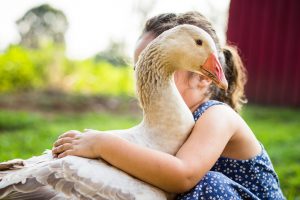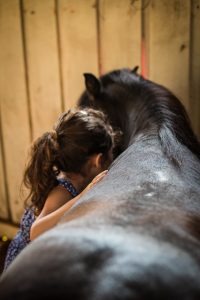In today’s culture, over sheltering and germophobia have become commonplace. Parents cringe at the thought of their child picking up a beetle, or walking barefoot in the grass. While caution and safety is very important, equally important is giving your child time outdoors. Compelling research has recently been found to backup the positives of raising our children to have outdoor time and even to be around livestock. Our great-grandparents who grew up on the farm, definitely knew a thing or two!
Generally More Healthy
Children raised around livestock are generally more healthy. According to John Hopkins University, babies who were regularly exposed to dirt, germs, and animal dander developed significantly lower risks of developing asthma and allergies. Instead of removing all germs, good and bad, from your child’s environment, allowing them close contact with nature and animals actually boosts their immune system. They also benefit from more vitamin D from the sun and exercise.
Healthier Diet
There is no secret a farm provides food at its peak of freshness. Raising your own chickens for fresh eggs is not only more ethical, it also boosts the nutrients you serve your family.

You are what you eat. Therefore, you are also what the thing you eat, eats. On my little farm, we occasionally raise our own meat chickens, and honestly it has been one of the best things we have ever done! Not only does our child benefit from fresh, nutrient dense food, she also benefits from learning where her food comes from. Our meat chickens get a varied diet, lots of fresh air and sunshine, making them happier and healthier, in turn doing the same for us. Additionally, we do not spray our garden.I have no issues with my daughter stepping into the garden and munching on a tomato right off the vine.
Fun and Friendship
As a young child, some of my best friends were my horse and my dogs. I am sure many of you out there can relate. Unfortunately, too many children today will never know that joy. Screen time has replaced actual interaction. Get your child a pet (dog, chicken, or anything in between) and I can guarantee they will be happier!
Empathy and Loss
As anyone with livestock knows, with great gain comes great loss.
Loss happens, death happens, and although the sting of loss hurts, children benefit from learning how to deal with it. Learning how to deal with the loss of an animal friend can better prepare them to deal with their feelings of loss later in life. Raising your own livestock for meat is one such example. It is both a reward and a challenge. A child who understands and helps in the raising of livestock for food has to come to terms with realities most adults haven’t had to accept. Where our food comes from, why we need them, and why we give them good lives and respect, are all the things children with livestock must learn.
On our little farm, we had a mother duck who was sitting on a nest of eggs. Unfortunately, in the night a predator killed her and smashed most of her eggs, excluding one. We incubated the egg, and out hatched the most adorable, fluffy yellow duckling you ever did see! It imprinted on my young daughter. They both truly loved each other for almost 2 weeks, until tragedy struck. Perhaps the same sneaky predator that took the mother, forced its way through our strong defensive pen, killing our baby duckling. It was, and still is, a deep emotional wound she and I think about from time to time. Although it was a tragedy, it forced us to have a conversation about life and death, to connect with our feelings, and for me to explain to her that she would one day see him again.
Compassion
Children raised with livestock learn compassion in a variety of ways by helping sick, hungry, or injured animals. They learn to treat creatures with a gentleness and patience. This compassion will be carried with them all their lives.
Courage
Sometimes being a child with livestock means overcoming fears. Fear of the big, scary goat, who actually just wants to be friends. Fear of collecting eggs from under the hen, who kindly allows the little hand to take her eggs. Fear of the tall horse, who allows the child a gentle bareback ride in his stall. Courage to overcome fears, very realistic fears, is a lifelong tactic not quickly forgotten.
Hard Work
Having livestock isn’t all a blooming fairy tale of holding baby chicks and riding wild ponies. It is a lot of hard work! There are some days children may not want to help with the chores, but they will learn they simply have to. It can be stinky, sweaty, and down right laborious, but what good thing in life worth having wasn’t hard?

Lessons in Biology
As a child growing up in the presence of livestock, they will learn to be great observers. Observers of ALL things! Things that will lead to questions. Questions about birth, death, biology, reproduction, and life cycles will all become part of a child’s understanding. They will become great seekers and develop problem solving skills not found on a tablet screen.
The pros of letting your children help you raise livestock far outweigh the cons.
Raising poultry is a great gateway into livestock ownership. Chickens are relatively easy to care for and don’t need a huge amount of space. Almost any breed of chicken can become very tame if around people enough as a chick. Whether it be dogs, cats, horses, cows, goats, chickens, ducks, geese, or anything in between, all children can benefit in some way.
Alongside livestock, your children or grandchildren will learn to slow down and appreciate all forms of life, in addition to molding memories and lessons that will last a lifetime!